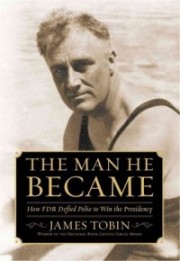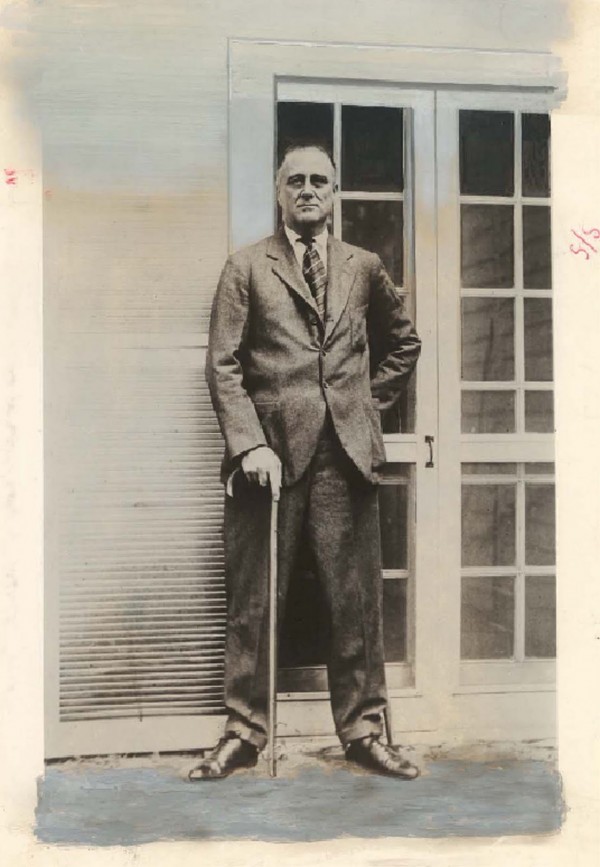FRESH AIR
Americans remember Franklin Delano Roosevelt as the president who led the country through the Great Depression and World War II. He bolstered the nation’s spirits with his confidence, strength and optimism, despite being crippled by polio, a disability that’s largely invisible in photographs and newsreels of his presidency. But historian James Tobin  says, despite misimpressions to the contrary, Americans of Roosevelt’s day were well aware of his disability. In fact, Tobin says, Roosevelt’s struggle to overcome his affliction was an important part of the personal narrative that fueled his political career. Tobin tells Fresh Air‘s Dave Davies, “[Roosevelt] only discovered who he really was through the ordeal of polio. … It gave him a kind of confidence in his own strength that perhaps no one can have until you’re tested.” Roosevelt contracted polio at the age of 39, and Tobin’s new book explores his battle with the illness and the ways it molded his character and influenced his rise in the Democratic Party. Tobin has written previous books about the Wright brothers and war correspondent Ernie Pyle. His new book is The Man He Became: How FDR Defied Polio To Win The Presidency. MORE
says, despite misimpressions to the contrary, Americans of Roosevelt’s day were well aware of his disability. In fact, Tobin says, Roosevelt’s struggle to overcome his affliction was an important part of the personal narrative that fueled his political career. Tobin tells Fresh Air‘s Dave Davies, “[Roosevelt] only discovered who he really was through the ordeal of polio. … It gave him a kind of confidence in his own strength that perhaps no one can have until you’re tested.” Roosevelt contracted polio at the age of 39, and Tobin’s new book explores his battle with the illness and the ways it molded his character and influenced his rise in the Democratic Party. Tobin has written previous books about the Wright brothers and war correspondent Ernie Pyle. His new book is The Man He Became: How FDR Defied Polio To Win The Presidency. MORE
![]() RELATED: In the early ’60s, Dave Van Ronk, still in his 20s, had become the grand honcho of the Washington Square folk scene in
RELATED: In the early ’60s, Dave Van Ronk, still in his 20s, had become the grand honcho of the Washington Square folk scene in  New York. He never managed to get as far beyond that role as he deserved. (His autobiography, The Mayor of MacDougal Street, helped inspire Joel and Ethan Coen’s new movie, Inside Llewyn Davis.) Perhaps the fine new anthology Down in Washington Square will give Van Ronk, who died in 2002, a long-needed boost. Van Ronk was not a rambler like Woody Guthrie or even a New York City outsider like Bob Dylan, so it’s understandable that he would see the folk-music-revival movement as his favorite neighborhood phenomenon. Besides, he never considered himself strictly a folk performer: His first love was traditional jazz tunes. Down in Washington Square does a particularly fine job of presenting Van Ronk as a conveyer, an apostle even, of diverse modes of old music. It enables him to be black, white, male, female, young, old, a murderer and a martyr. MORE
New York. He never managed to get as far beyond that role as he deserved. (His autobiography, The Mayor of MacDougal Street, helped inspire Joel and Ethan Coen’s new movie, Inside Llewyn Davis.) Perhaps the fine new anthology Down in Washington Square will give Van Ronk, who died in 2002, a long-needed boost. Van Ronk was not a rambler like Woody Guthrie or even a New York City outsider like Bob Dylan, so it’s understandable that he would see the folk-music-revival movement as his favorite neighborhood phenomenon. Besides, he never considered himself strictly a folk performer: His first love was traditional jazz tunes. Down in Washington Square does a particularly fine job of presenting Van Ronk as a conveyer, an apostle even, of diverse modes of old music. It enables him to be black, white, male, female, young, old, a murderer and a martyr. MORE

